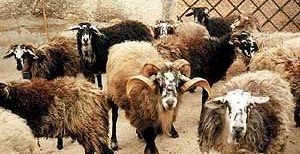Istrian Milk,
or Istriana or Carsolina, sheep are milk sheep from the Istria and Karst regions of Italy. The Istria sheep
breeders have traditionally bred domestic, autochthonous (indigenous) sheep which they called Istriana or
Carsolina. Through the years they have bred Istrian sheep mainly for their
unusual and distinct long-stepping walk and the ability to graze in rocky
terrain. While they will graze even on dry old grass, they are quite skillful
at finding fresh grass between rocks.
Istrian shep are
found in the provinces of Udine, Gorizia, Trieste (Friuli-Venezia Giulia -
Italy) and Slovenia.
Istrian sheep
have quite a large frame with a highly placed torso and long strong legs. Their
udders are shaped right, fastened high, with large teats. They have a narrow
head, with the nose’s crest and jutting out ears, are placed on a long neck.
Their wool is
multicolored and does not cover their entire body. Their legs and belly are
naked and in other parts they are only covered with shaggy fleece. The Istria
breeders bred white, black, spotted, patchy sheep, short-eared sheep, horned
sheep, horn-less sheep, and the list goes on and on.
Content and photo source: Agraria.org.

